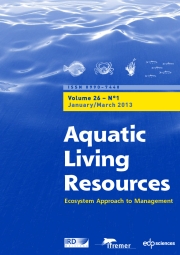Crossref Citations
This article has been cited by the following publications. This list is generated based on data provided by
Crossref.
Castello, Leandro
Viana, João P.
Watkins, Graham
Pinedo-Vasquez, Miguel
and
Luzadis, Valerie A.
2009.
Lessons from Integrating Fishers of Arapaima in Small-Scale Fisheries Management at the Mamirauá Reserve, Amazon.
Environmental Management,
Vol. 43,
Issue. 2,
p.
197.
Gaertner, Daniel
2010.
Estimates of historic changes in total mortality and selectivity for Eastern Atlantic skipjack (Katsuwonus pelamis) from length composition data.
Aquatic Living Resources,
Vol. 23,
Issue. 1,
p.
3.
Guillotreau, Patrice
Salladarré, Frédéric
Dewals, Patrice
and
Dagorn, Laurent
2011.
Fishing tuna around Fish Aggregating Devices (FADs) vs free swimming schools: Skipper decision and other determining factors.
Fisheries Research,
Vol. 109,
Issue. 2-3,
p.
234.
Stehfest, Kilian M.
Patterson, Toby A.
Dagorn, Laurent
Holland, Kim N.
Itano, David
and
Semmens, Jayson M.
2013.
Network analysis of acoustic tracking data reveals the structure and stability of fish aggregations in the ocean.
Animal Behaviour,
Vol. 85,
Issue. 4,
p.
839.
Taquet, Marc
2013.
Fish aggregating devices (FADs): good or bad fishing tools? A question of scale and knowledge.
Aquatic Living Resources,
Vol. 26,
Issue. 1,
p.
25.
Lopez, Jon
Moreno, Gala
Sancristobal, Igor
and
Murua, Jefferson
2014.
Evolution and current state of the technology of echo-sounder buoys used by Spanish tropical tuna purse seiners in the Atlantic, Indian and Pacific Oceans.
Fisheries Research,
Vol. 155,
Issue. ,
p.
127.
Wilhelmsson, Dan
and
Langhamer, Olivia
2014.
Marine Renewable Energy Technology and Environmental Interactions.
p.
49.
Walker, Emily
Rivoirard, Jacques
Gaspar, Philippe
and
Bez, Nicolas
2015.
From forager tracks to prey distributions: an application to tuna vessel monitoring systems (VMS).
Ecological Applications,
Vol. 25,
Issue. 3,
p.
826.
Macusi, Edison D.
Abreo, Neil Angelo S.
and
Babaran, Ricardo P.
2017.
Local Ecological Knowledge (LEK) on Fish Behavior Around Anchored FADs: the Case of Tuna Purse Seine and Ringnet Fishers from Southern Philippines.
Frontiers in Marine Science,
Vol. 4,
Issue. ,
Maufroy, Alexandra
Kaplan, David M.
Bez, Nicolas
De Molina, Alicia Delgado
Murua, Hilario
Floch, Laurent
Chassot, Emmanuel
and
Poos, Jan Jaap
2017.
Massive increase in the use of drifting Fish Aggregating Devices (dFADs) by tropical tuna purse seine fisheries in the Atlantic and Indian oceans.
ICES Journal of Marine Science,
Vol. 74,
Issue. 1,
p.
215.
Lima, Juliano Silva
Zappes, Camilah Antunes
Di Beneditto, Ana Paula Madeira
and
Zalmon, Ilana Rosental
2018.
Artisanal fisheries and artificial reefs on the southeast coast of Brazil: Contributions to research and management.
Ocean & Coastal Management,
Vol. 163,
Issue. ,
p.
372.
Lima, Juliano Silva
Zalmon, Ilana Rosental
and
Love, Milton
2019.
Overview and trends of ecological and socioeconomic research on artificial reefs.
Marine Environmental Research,
Vol. 145,
Issue. ,
p.
81.
Brehmer, Patrice
Sancho, Gorka
Trygonis, Vasilis
Itano, David
Dalen, John
Fuchs, Ariel
Faraj, Abdelmalek
and
Taquet, Marc
2019.
Towards an Autonomous Pelagic Observatory: Experiences from Monitoring Fish Communities around Drifting FADs.
Thalassas: An International Journal of Marine Sciences,
Vol. 35,
Issue. 1,
p.
177.
Silva Lima, Juliano
and
Zalmon, Ilana R.
2022.
Impact of Artificial Reefs on the Environment and Communities.
p.
87.
Santamaria Reyes, Jose Antonio
and
García, José Odón
2022.
Impact of Artificial Reefs on the Environment and Communities.
p.
70.
Murua, Jefferson
Moreno, Gala
Dagorn, Laurent
Itano, David
Hall, Martin
Murua, Hilario
and
Restrepo, Victor
2023.
Improving sustainable practices in tuna purse seine fish aggregating device (FAD) fisheries worldwide through continued collaboration with fishers.
Frontiers in Marine Science,
Vol. 10,
Issue. ,
Escalle, Lauriane
Scutt Phillips, J.
Lopez, J.
Lynch, J. M.
Murua, H.
Royer, S. J.
Swimmer, Y.
Murua, J.
Sen Gupta, Alex
Restrepo, V.
and
Moreno, G.
2024.
Simulating drifting fish aggregating device trajectories to identify potential interactions with endangered sea turtles.
Conservation Biology,




